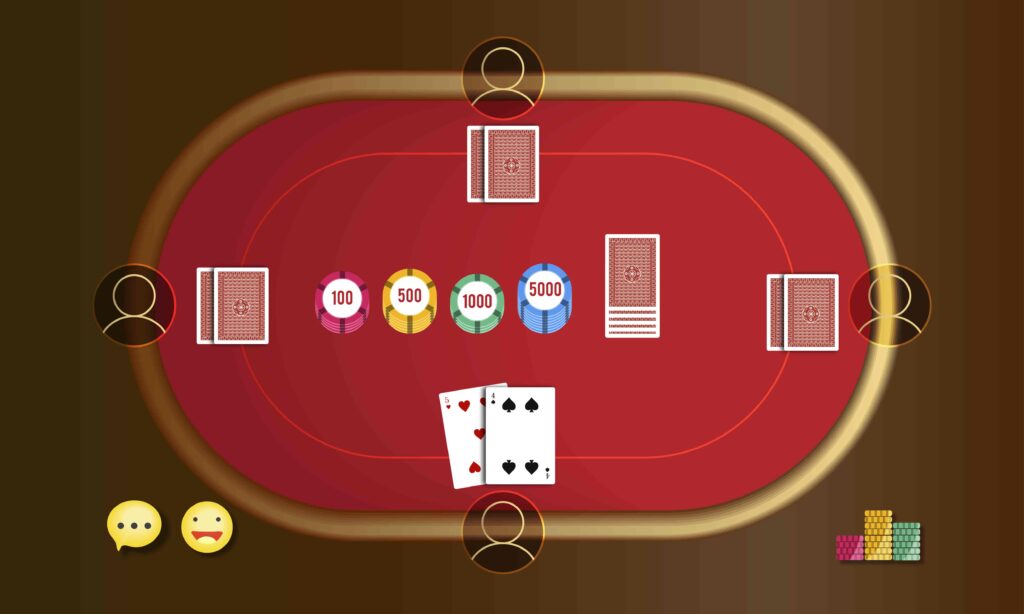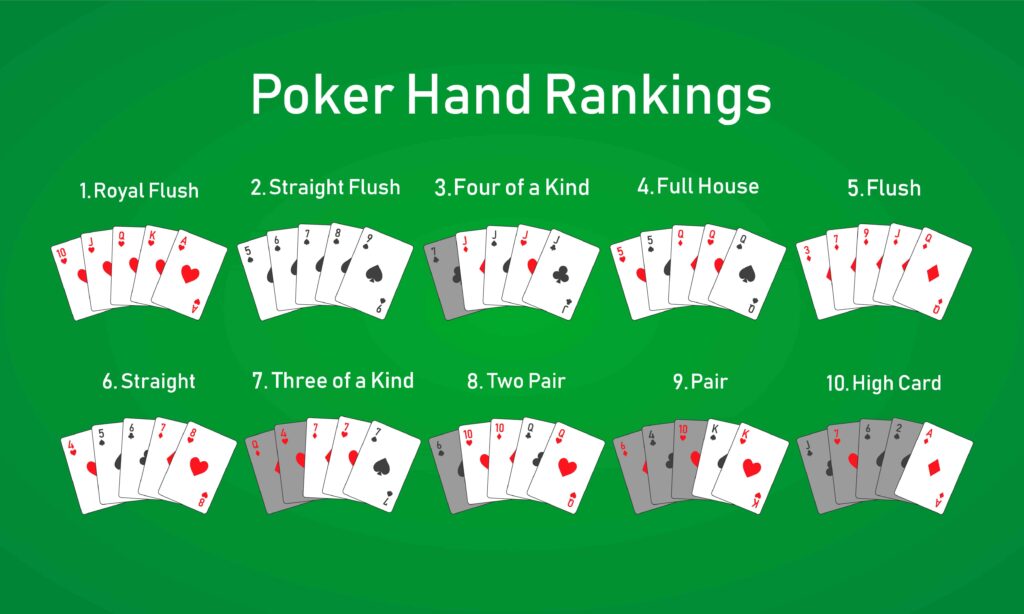Online poker is one of the most popular and accessible card games, attracting beginners and professionals alike. For those new to the game, navigating the basics, rules, and different game variants can be overwhelming. This online poker guide offers a comprehensive introduction to how to play poker online, covering the rules, essential strategies, and various poker variants to help you build confidence as you start your journey.
Table of Contents
ToggleWhat is Online Poker?
Online poker replicates the classic casino game, allowing players to compete against each other on virtual platforms. Unlike casino games where you play against the house, poker is a player-versus-player game, so winning involves a mix of strategy, skill, and luck.

Online platforms offer numerous poker variants, making it easy to find games that suit your skill level, preferences, and bankroll.
Poker Rules for Beginners: Understanding the Basics
Though poker has many variations, the core poker rules for beginners are similar across them, which you will discover in this online poker guide. Poker is typically played with a standard 52-card deck, and the goal is to make the best five-card hand according to established hand rankings.
Poker Hand Rankings (From Highest to Lowest)
- Royal Flush: Cards from the same suit (symbol), where you need five cards, one of each Ace, 10, Jack, Queen, and King, to have a Royal Flush.
- Straight Flush: Five cards of the same suit that form a proper consecutive order (e.g 4, 5, 6, 7, and 8).
- Four of a Kind: Four cards of the same rank.
- Full House: A pair of cards, together with one set of three of a kind.
- Flush: Five cards of the same suit.
- Straight: Five consecutive cards of different suits.
- Three of a Kind: Three cards of the same rank.
- Two Pair: Two pairs of different ranks.
- One Pair: Two cards of any suit/symbol, but they must have the same numerical value (e.g a 3 of diamonds and a 3 of hearts).
- High Card: If a player’s cards cannot make any hands, the card with the highest value is the victor.

In each game, players aim to either have the highest-ranking hand or convince opponents to fold through strategic betting.
Basic Game Structure
- Blinds: Small and Big Blinds are forced bets by two players at the table to initiate action.
- Dealing: The phase where cards are handed out to the players, with the exact amount depending on which variant they are playing.
- Betting Rounds: Players bet, fold, call, or raise, depending on their hand.
- Showdown: After the final betting round, players reveal their hands, and the best hand wins the pot.
Different Variants of Online Poker
There are many different versions of online poker games, and these variants all differ in various ways. In this online poker guide, here are some of the most popular versions for beginners to explore and learn how to play poker online:

1. Texas Hold’em
Most Popular Variant
How It’s Played: Each player is dealt two private cards (hole cards), and five community cards are dealt face-up on the table. Players use any combination of these seven cards to make the best five-card hand.
Ideal For: Beginners who are learning how to play poker online, as it’s widely played and has a straightforward structure.

2. Omaha
Gameplay resembles Texas Hold’em poker, but using a larger amount of cards
How It’s Played: Players are dealt four hole cards instead of two and must use exactly two from their hand combined with three community cards to form the best hand.
Ideal For: Intermediate players looking to expand their skills.

3. Seven-Card Stud
Classic Poker Variant with No Community Cards
How It’s Played: Each player is dealt seven cards (three face-down, four face-up). This game’s objective is for players to form the best possible hand they can using five cards. There are no community cards, and betting occurs after each deal.
Ideal For: Players interested in traditional poker without community cards.

4. Razz
Unique Lowball Poker Variant
How It’s Played: When playing Razz, players aim to make their hand the lowest possible value. Players receive seven cards, and the lowest five-card hand wins.
Ideal For: Players seeking a change from traditional high-hand poker.

5. Five-Card Draw
Simple and Beginner-Friendly
How It’s Played: Each player is dealt five cards, and after an initial betting round, players can discard and replace cards to improve their hand. The winner is whoever’s hand of five cards is the largest.
Ideal For: Absolute beginners looking to learn basic poker principles.

6. Chinese Poker (Open-Face Chinese)
Fast-Paced and Unique Scoring
How It’s Played: Players receive 13 cards to form three hands (two five-card hands and one three-card hand). Points are awarded based on each hand’s strength.
Ideal For: Casual play and beginners interested in non-traditional poker.

Basic Online Poker Strategies for Beginners
While poker is a game of skill, beginners should focus on foundational strategies when learning how to play poker online. These strategies will be outlined in brief in this online poker guide, to improve their odds and confidence.
1. Starting Hand Selection
Be selective about which hands to play. Avoid weak hands like unsuited low cards and focus on strong starting hands such as high pairs (e.g., AA, KK) and face cards.
2. Position Play
Your position at the table is crucial. Players in late positions have the advantage of seeing their opponents’ actions before making a move, allowing them to make more informed betting decisions.
3. Understand the Value of Folding
Folding is a key part of poker strategy. Don’t be afraid to fold if your hand isn’t strong, especially if other players are showing aggression. Knowing when to fold saves your bankroll for better hands.
4. Avoid “Chasing”
Chasing refers to betting or calling in hopes of completing a draw when the odds are unfavorable. Beginners should avoid this costly mistake and focus on hands with strong winning potential.
5. Learn to Bluff Carefully
Bluffing is an advanced tactic, but beginners can start by learning the basics. Semi-bluffing, where you bet with a drawing hand that has potential to improve, is safer for beginners than outright bluffs.
6. Bankroll Management
Managing your bankroll is essential. Set limits on how much you’re willing to spend, and avoid the temptation to increase your stakes after a losing streak. A steady approach will ensure you can play longer and improve over time.

Additional Tips for Online Poker Success
- Track Your Progress: Many platforms allow you to track your game history, so review your hands and analyze your play to learn from mistakes.
- Use Poker Tools: Several poker tracking tools and calculators can help beginners understand odds and make better decisions.
- Practice Regularly: Poker is a skill game, so the more you play, the better you’ll become at reading opponents, managing bets, and recognizing patterns.
- Play with Focus: Avoid distractions when playing online poker. Being fully focused will improve your ability to read the table and make strategic decisions.
Common Mistakes to Avoid in Online Poker
- Playing Too Many Hands: Many beginners get caught up in the excitement and play too many weak hands. Stick to selective starting hands.
- Over-Betting or Going All-In Too Often: Inexperienced players may overestimate their hand’s strength. Avoid aggressive moves until you’re more familiar with the game’s dynamics.
- Ignoring Position: New players often don’t understand the importance of position. Remember that late position is advantageous and can improve your decision-making.
- Failing to Adapt: Each game and opponent is different, so adjust your strategy based on the table dynamics rather than relying on a fixed approach.
Conclusion
Mastering online poker takes time and practice, but with this online poker guide and consistent effort, beginners can build a solid foundation and improve their skills. Start with a basic understanding of the rules, carefully select your starting hands, and use low-stakes games to develop your skills gradually. Explore different poker variants like Texas Hold’em, Omaha, and Seven-Card Stud to find what you enjoy most. Remember that patience, discipline, and practice are key components of success in online poker. Good luck at the tables, and enjoy the journey of learning one of the world’s most exciting card games!




